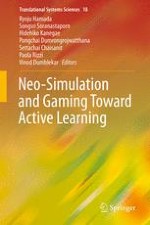2019 | OriginalPaper | Chapter
Augmented Reality in Finance Learning Games
Author : Blazej Podgorski
Published in: Neo-Simulation and Gaming Toward Active Learning
Publisher: Springer Nature Singapore
Activate our intelligent search to find suitable subject content or patents.
Select sections of text to find matching patents with Artificial Intelligence. powered by
Select sections of text to find additional relevant content using AI-assisted search. powered by
